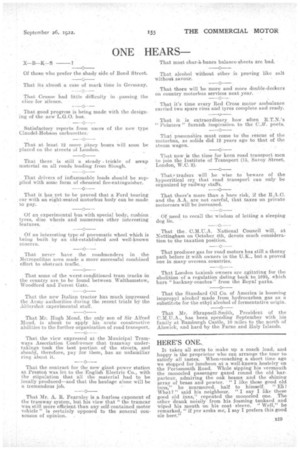ONE HEARS
Page 3

If you've noticed an error in this article please click here to report it so we can fix it.
XBKS 7 Of those. who prefer the shady side of Bond Street.
That its almat a case of mark time in Germany.
That Crueoe had little difficulty in -passingthe olice for silence.
That. good progress is being made with the designing of the new L.G.O. bus.
Satisfactory reports from users of the new type Claudel-Hobson carburetter..
That at least 12 more jitney buses will soon be placed on the streets of London.
That there is still a steady trickle of scrap material on all roads leading from Slough.
That drivers of inflammable loads should be supplied with some form of chemical fire-extinguisher.
That it has yet tcehe Proved that a Ford touring car with an eight-seated motorbus body can be made to pay. • Of an experimental bus with special body, cushion, tyres, disc wheels and numerous other interesting features.
Of an interesting type of pneumatic wheel which is being built by an old-established and well-known concern.
That never ha-ve the roadmenclers in the Metropolitan area made a more successful combined effort to obstruct traffic..
That some of the worst-conditioned tram tracks in the country are to be found between Walthamstow, Woodford and Forest Gate.
That the new Italian tractor haS much impressed the Army authorities during the recent trials by the Aldershot. experimental staff.
That Mr. Hugh Mond, the only son of Sir Alfred Mond, is about to apply his acute constructive abilities to the further organization of road transport.
That the view expressed at the Municipal Tramways Association Conference that tramway undertakings took the best portion of the streets, and should, therefore, pay for them, has an unfamiliar ring about it.
That the contract for the new giant power station at Prestoe was let to the 'English Electric Co., with the stipulation that all the material had to be locally produced—and that the haulage alone will be a tremendous job.
That Mr. A. R. Fearnley is a fearless exponent of the tramway system, but his view that " the tramcar was still more efficient than any self-contained motor vehicle " is certainly opposed to the general consensus of opinion. . That most char-h-bancs balance sheets are bad, That alcohol without ether is proving like salt without savour.
That there will be more and more double-deckers on country motorbus services next year.
That it's time every Red Cross motor ambulance carried two spare rims and tyres complete and ready.
That it is extraordinary how often R.T.N.'s " Pointers " furnish inspiration to the G.M. poets.
That pnetundties must come to the rescue of the motorbus, as solids did 32 years ago to that of the steam wagon.
. That now is the time for keen road transport men to join the Institute of Transport (15, Savoy Street, London, W. C. 2).
That e traders will he wise to beware of the hypocritical cry that road transporh can only be organized by railway staffs.
That there's more than a bare risk, if the R.A.C. and the A.A. are not careful, that taxes on private motorcars will be increased.
Of need to recall the wisdom of letting a sleeping dog lie.
That the C.M.U.A. National Council will, at Nottingham on October 4th, devote much consideration to the taxation position.
That producer gas for road motors has still a thorny path before it with owners in the U.K., but a proved one in many oversea countries.
That London taxicab owners are agitating for the abolition of a regulation dating back to 1695, which bars " hackney-coaches" from the Royal parks.
That the Standard Oil Co. of America is booming isopropyl aleohor made from hydrocarbon gas as a substitute for the ethyl alcohol of fermentative origin.
That Mr. Shrapnell-Smith, President of the C.M.U.A., has been spending September with his family. at Bamburgh Castle, 10 miles to the north of Alnwick, and hard by the Farne and Holy Islands.




























